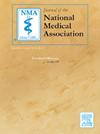医院医师对不同种族病患照护讨论目标的看法
IF 2.3
4区 医学
Q1 MEDICINE, GENERAL & INTERNAL
引用次数: 0
摘要
先前的文献表明,不同种族和民族背景的患者在住院期间不太可能参与护理目标的讨论。本研究的目的是阐明在这一弱势群体中实现护理目标的障碍。方法对某大型三级医院的住院医师进行调查。使用REDCap电子数据采集工具收集研究数据。这种需求评估将通过对医院医生进行匿名和自愿调查来进行。采用描述性统计和Chi检验进行分析。数据记录由医院医生的匿名调查答复组成。问题将包括与不同种族和民族背景的患者讨论护理目标的障碍和促进因素,以及医院医生对当前建议的看法,以改善这一人群的这些讨论。本研究的第一部分评估了医院医生对进行护理目标对话的信心。本研究的第2部分评估了医院医生在不同种族和种族背景的患者之间讨论护理目标的障碍。第3部分评估医院医生在临床实践中对GOC对话的实际感受。结果数据显示,在与非英语患者交谈时,感到非常有信心与患者进行G.O.C讨论的医院医生人数显著下降,从67%下降到19%。在讨论生命维持系统时也有类似的趋势,从81%上升到19%。此外,52%的人表示语言是与患者进行GOC讨论的中度到极端障碍。有趣的是,只有4%的人认为种族和民族是GOC讨论的一个中等障碍,11%的人认为灵性或宗教是GOC讨论的一个障碍。此外,当问及将建议的问题整合到服务不足/多样化的人群时,48%的人认为这在临床实践中是不现实的。结论展望未来,我们有必要消除临终关怀方面的差异。此外,目标是使用这些数据为医院医生创建以护理目标和高级护理计划为中心的课程。本文章由计算机程序翻译,如有差异,请以英文原文为准。
Hospitalists' Perspective on Goals of Care Discussion on Racially and Ethnically Diverse Patients
Background
Previous literature has shown that patients of racial and ethnic diverse backgrounds are less likely to be engaged in goals of care discussions during hospitalization. The objective of this study is to shed light on barriers to addressing goals of care in this vulnerable population.
Methods
All hospitalists at a major tertiary center were surveyed. Study data were collected using REDCap electronic data capture tools. This needs assessment will be performed via an anonymous and voluntary survey of hospitalists. Descriptive statistics and Chi test will be used for analysis.
Data records consist of Anonymous survey responses from hospitalists. Questions will include barriers and facilitators to discussing Goals of Care with patients of diverse racial and ethnic backgrounds as well as hospitalist perceptive on current recommendations to improve these discussions in this population. Part 1 of the study assesses hospitalist confidence in carrying Goals of Care conversations. Part 2 of the study assesses hospitalists barriers to goals of care discussions amongst patients of ethnic and racial backgrounds. Part 3 assessing how practical hospitalists feel GOC conversations are in their clinical practice.
Results
The data shows that the number of hospitalists who feel very and extremely confident having G.O.C discussions with patient’s drops significantly when talking to non- English speaking patients from 67% to 19%. There is a similar trend when discussing life support from 81% to 19%. Additionally, 52% state that language is a moderate to extreme barrier to GOC Discussions with patients. Of interest, only 4% state that race and ethnicity is a moderate barrier to GOC discussions and 11% state that spirituality or religion is a barrier to GOC discussions. Additionally, when asking about integrating the recommended questioning to underserved/diverse populations 48% felt that it would not be realistic in clinical practice.
Conclusion
The data suggests that looking forward it is necessary for us to eliminate disparities in end of life care. Additionally, it is the goal to use this data to create a curriculum for hospitalists centered around Goals of Care and Advanced Care planning.
求助全文
通过发布文献求助,成功后即可免费获取论文全文。
去求助
来源期刊
CiteScore
4.80
自引率
3.00%
发文量
139
审稿时长
98 days
期刊介绍:
Journal of the National Medical Association, the official journal of the National Medical Association, is a peer-reviewed publication whose purpose is to address medical care disparities of persons of African descent.
The Journal of the National Medical Association is focused on specialized clinical research activities related to the health problems of African Americans and other minority groups. Special emphasis is placed on the application of medical science to improve the healthcare of underserved populations both in the United States and abroad. The Journal has the following objectives: (1) to expand the base of original peer-reviewed literature and the quality of that research on the topic of minority health; (2) to provide greater dissemination of this research; (3) to offer appropriate and timely recognition of the significant contributions of physicians who serve these populations; and (4) to promote engagement by member and non-member physicians in the overall goals and objectives of the National Medical Association.

 求助内容:
求助内容: 应助结果提醒方式:
应助结果提醒方式:


